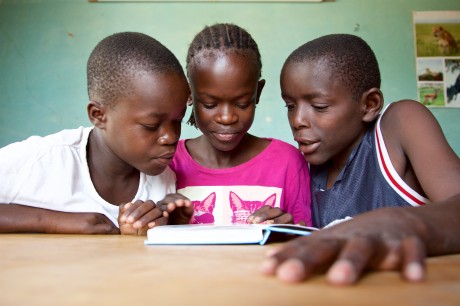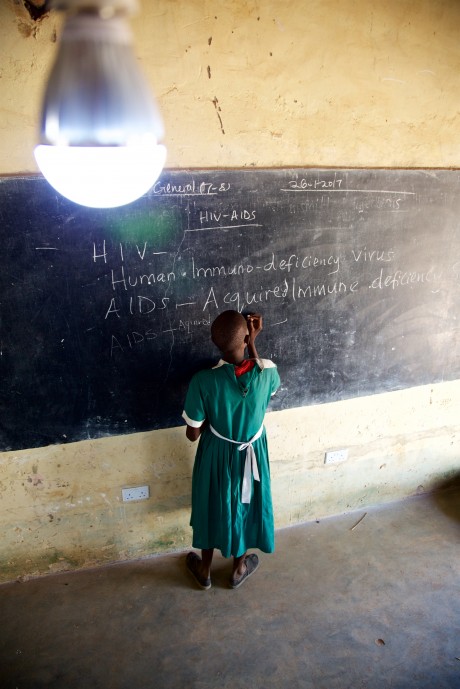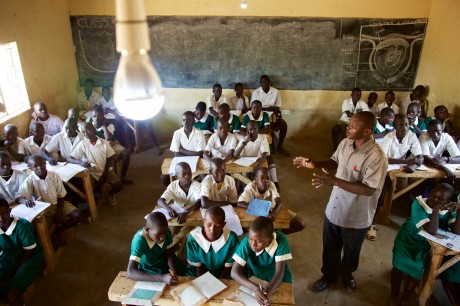Living in the UK I think you would agree that we take electricity and the ability to easily access it for granted. Almost everything we do uses it; and would we be able to survive in a world without it? The problem is that many people in developing countries have little to no access to it and will continue to have no access to it unless something is done quickly.
90% of the people in the areas in which Ace Africa works do not have access to electricity. They simply cannot afford to install or maintain the equipment and hardware necessary for mains supply due to the extreme poverty they live in. It severely limits economic development, limits productivity in schools and reduces life chances that even basic services such as fridges, light bulbs and electric cookers could provide. As you can imagine, lack of energy in schools grievously affects a child’s ability to learn. To begin with, not having electricity means the lighting of classrooms is extremely difficult with paraffin lamps being expensive and dangerous. Children therefore struggle to do homework in the evening and the morning, hampering their ability to learn and fulfil their full potential. This is especially true for students with special needs, requiring extra time and tutoring during the school day. Electrically powered fridges are likewise urgently needed to store both essential medical supplies and food for the children; research suggests,even 1 meal per day at school can boost a child’s ability to learn and retain information, making schooling easier for them and the teacher. So far, we have established that at the heart of all these major, life threatening problems is one route cause: no electricity. Electricity can come from many different sources, one of them being solar panels, which although is one of the more expensive and complex methods it is certainly the most reliable and seeing as Africa benefits from consistent weather conditions it is the perfect place to install them.

Picture 1. Children at school in Siaya County, Western Kenya.
Ace Africa, with the help of the Memorial for Mr Paul Bradshaw, will now be able to install solar panels to 10 different schools in rural Siaya, Western Kenya. The main idea behind this project was to provide an easy to acquire, easy to maintain, health friendly and environmentally friendly source of electricity for the people of the county. Environmental responsibility is particularly important in this case as it promotes the mitigation of climate change; a factor of the upmost importance to Sub- Saharan populations who will be the most affected by it, but also the least able to cope with its impact.

Picture 2. Lighting in classrooms helps aid teaching and learning.
What the community members and Ace hope to achieve through this project are 5 primary impacts. The first of them being improved school performance. Solar power will enable the students to see better during the day and work in the school after and before school hours. The schools will also undertake extra support lessons from 6-7am and 6-7pm. The cost of living will then drop for many households as they no longer must spend money on paraffin and kerosene lamps to allow their children to complete homework in the house as it will be done at school. Additionally, both types of lamps produce black carbon which is hazardous to human health and contributes to global warming. Ace’s child-to-child program will be strengthened as the children will be able to continue their activities into the evening allowing them to further develop their peer learning skills. The improved transition rate of children to secondary school, through improved attendance, will allow more students in general to be educated at a higher level therefore, more people will be applicable for higher paying jobs. Finally, improved student nutrition and health means children will be more focussed on education and schooling over health issues.

Picture 3. Electricity allows classrooms to be lit and lessons to last longer.
If this programme is to be sustainable, it will also have to change and develop over time as the world itself does. As technology advances, the possibility of Ace Africa and people alike in tough situations also advances. For now though, we hope that this project allows the community of Siaya to develop and grow and eventually, itself to become sustainable.
Once again thank you to the Memorial of Mr Paul Bradshaw for providing us with the most generous of funds, allowing us to complete the project and thus change the lives of so many children across rural Western Kenya.
By intern, Jordan Howard Smith, Year 11, Eton College.